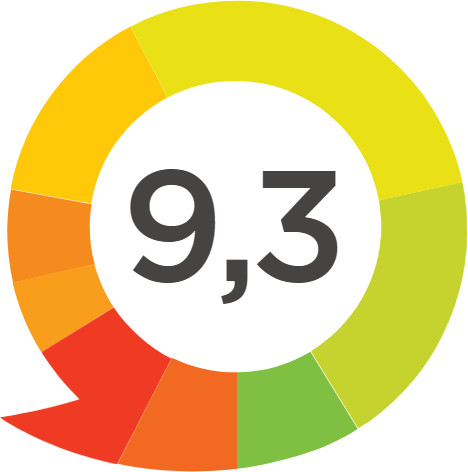- Free shipping in NL from €45
- Ordered before 14:00, shipped the same day
- International shipping

U.S.-Yemeni Mokhtar Alkhanshali fetches coffee from a country at war
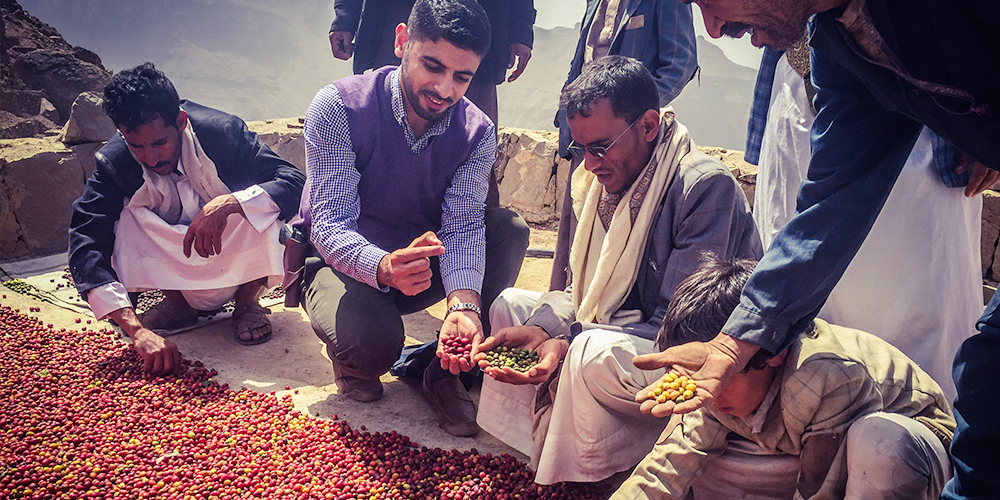
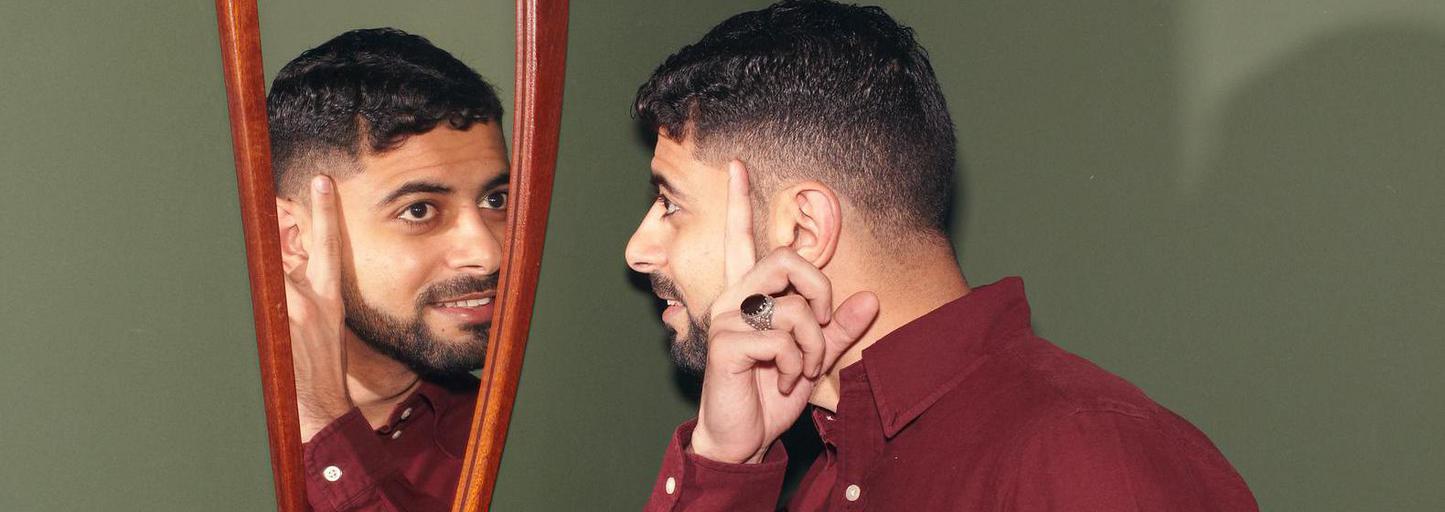
Source: Volkskrant
Author Dave Eggers wrote a book about it
Dave Eggers' new nonfiction book is called The Monk of Mocha. It's about Mokhtar Alkhanshali (29), born and raised in San Francisco. His dream: to grow up with exquisite coffee from his parents' country, Yemen. Why does a person want to get coffee from a country at war?
By: Sara Berkeljon March 6, 2018, 20:14
Mokhtar Alkhanshali shows a photo on his phone, it is the one he calls his "getaway selfie": azure sea, a skipper in a shirt, Alkhanshali smiling. Those who don't know the background see a vacation snapshot. But in reality, Alkhanshali escaped death in civil war-torn Yemen in April 2015, fleeing the country by crossing the Red Sea to Djibouti in this rickety single-engine boat.
He wanted to go home to San Francisco. And he was in a hurry, because he had to be back with his Samsonite suitcase full of Yemeni coffee beans in time for a major coffee trade show in Seattle. 'There was no other way to get away and the U.S. government offered no help. I knew the stories, of course, of refugees crossing the ocean in a small boat and washing up dead in Italy or Greece. You only do something like that if you have no other choice.'
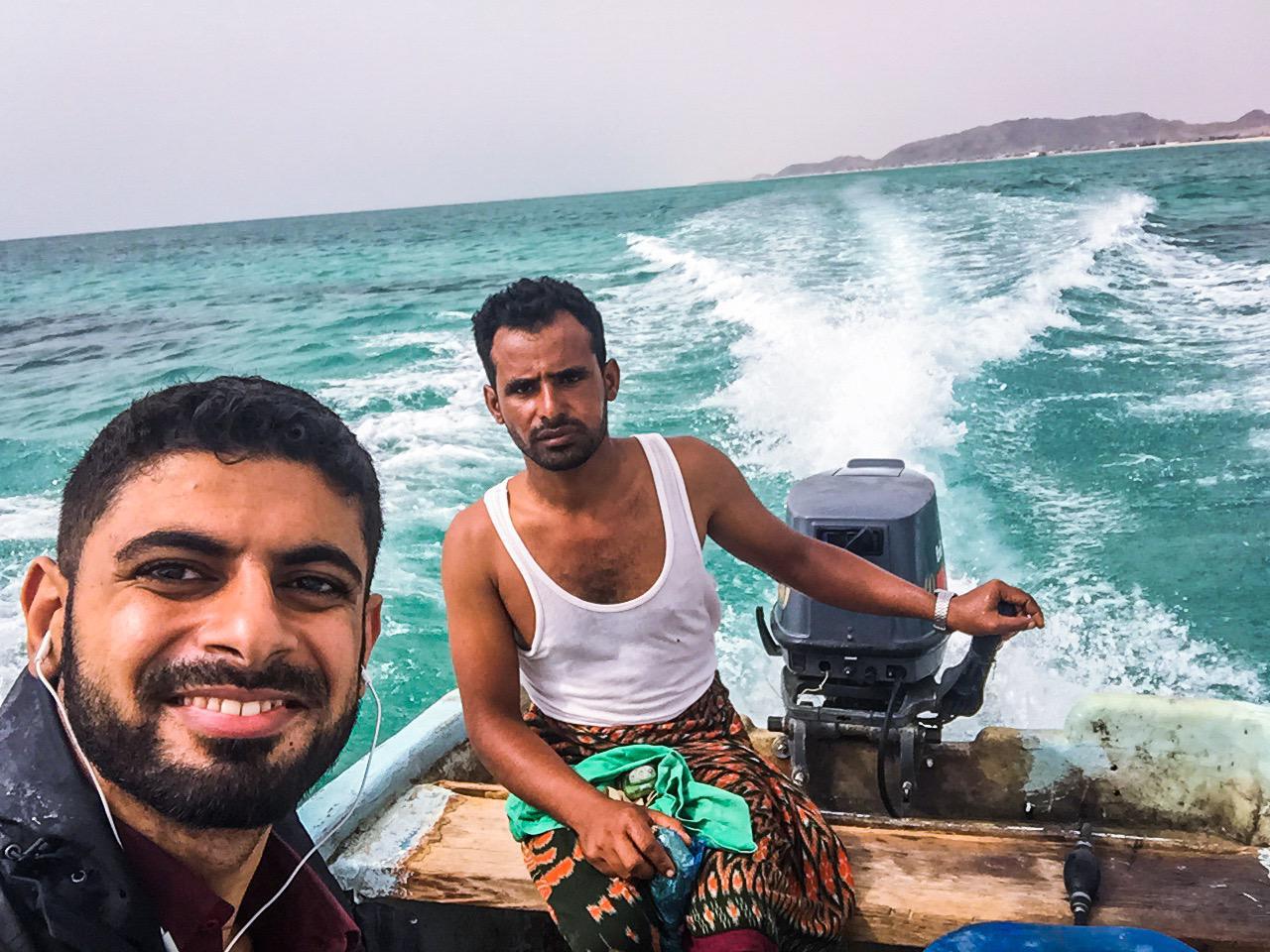
Alkhanshali's "getaway selfie," taken as he fled Yemen to Djibouti.
THE AMERICAN DREAM
Alkhanshali (29), born American, son of immigrants from Yemen, had brew his sights on a future as a trader in Yemeni coffee. He would have given anything for that. Success author Dave Eggers described Alkhanshali's story and the many obstacles in his path (malaria, air raids, rebel armies) in his new nonfiction book, The Monk of Mocha, published last month. Eggers, in his prologue, calls it "a story about the American dream, still alive and well but also threatened from all sides" and calls Alkhanshali one of the bridge-builders who "uniquely and fearlessly embodies the right of this nation to exist.
Mokhtar Alkhanshali grows up as one of seven children in a Yemeni family in a tiny apartment in The Tenderloin, the neighborhood known as the worst in San Francisco. A future as a bus driver, like his father, would be nice, especially because of the associated health insurance. He enjoys reading Harry Potter and secretly dreams big. 'I think those books appeal to so many children because you can imagine that you are also a kind of Harry, that you don't belong in the family or neighborhood where you grow up, that there is a greater future ahead of you as a wizard at Hogwarts. I have fantasized about that for a long time.'
'INCREDIBLY HAPPY'
Later, Alkhanshali becomes more politically aware: he considers going to law school to advocate for the rights of American Muslims, which have come under pressure after September 11, 2001. His parents think it's a great idea. 'I am now extremely glad I didn't. It's a shame that many young people don't do what they most want deep in their hearts, but pursue the career that pleases their parents the most.'
YOU BECAME A COFFEE MERCHANT. WHAT DID YOUR PARENTS THINK ABOUT THAT?
You became a coffee merchant. How did your parents feel about that?'It was hard for me to tell them that this was what I wanted. After all, they hadn't come all the way from Yemen to San Francisco to have me go the opposite way. They wouldn't understand, I was afraid. When I used to not do my best in school, they would say, "You can also go back to Yemen and work on a farm! You can imagine. They had to get used to the idea for a long time.'
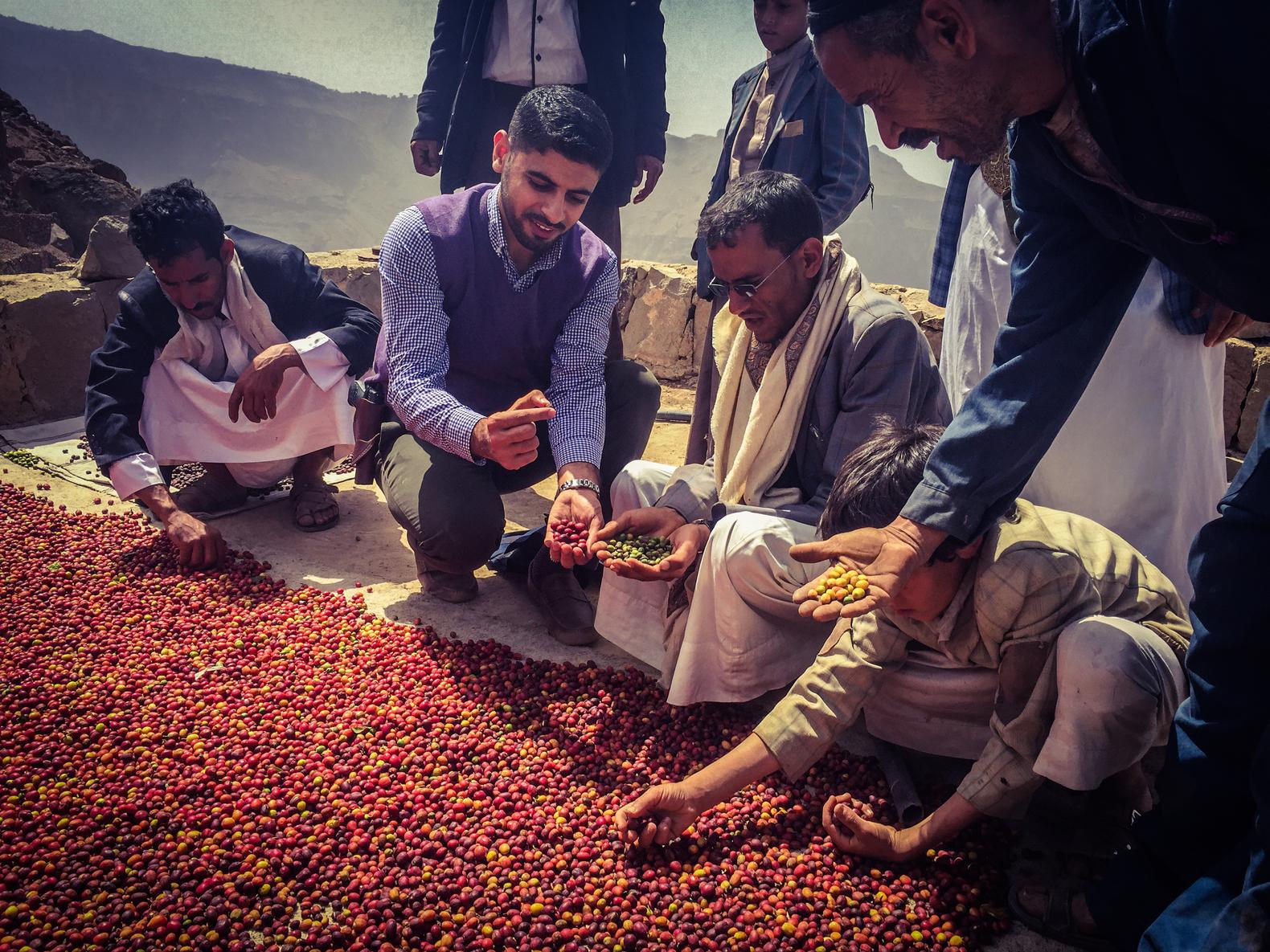
Alkhanshali explains to a farmer in Sana'a province the importance of picking only the red beans.
AND THAT WHILE UNTIL A FEW YEARS AGO YOU NEVER DRANK COFFEE.
'True. The same goes for Dave Eggers, he drank his first cup of coffee when he was 35, he had just had a baby and was looking for something to keep him awake. I knew nothing about coffee until six years ago. I only knew the coffee you can buy in American supermarkets and fast food restaurants that tastes like burnt popcorn. It's so bitter, you can't drink it without milk and sugar. I worked as a doorman, pardon me, lobby ambassador, in a luxury apartment building. There was a button to open the door, but I wasn't allowed to use it. I had to pay attention and every time someone arrived, jump up, run to the door and hold the door open. Behind the counter I was reading books: Das Kapital, things like that. I didn't know what I wanted to do with my life and it felt like it was all going nowhere. Until I got a text message from a friend: 'Do you ever look across the street?' I went to look and there was a statue of a man in Yemeni clothing holding a mug of coffee to his mouth with two hands. The logo of Hills Bros. a coffee company.'
Coffee and Yemen. Somewhere in Alkhanshali something awoke. This is what he wanted to know more about. Tradition has it that the first beverage was brewed from the coffee bean in Yemen in the 15th century in the port city of Mocha, which later became the world's main export port of coffee. Yemen was unable to maintain its position as a coffee superpower, the country was difficult to travel to and farmers increasingly chose to grow qat, the intoxicating leaves for which the market in Yemen was much larger than for coffee, a beverage that was hardly consumed in the country itself. And so Yemen was surpassed as a coffee country by other countries: Indonesia, Brazil, Ethiopia, Vietnam. For a long time, the beans from Yemen had the reputation of being the worst in the world.
'After seeing that statue, I went to a good coffee shop and ordered a cup of Ethiopian coffee. Suddenly I tasted blueberries, honeysuckle - I had never drunk coffee like that before. The barista told me that they bought the beans directly from the farmer and that this way the farmer earned as much as five times as much as if he did business with a wholesaler.'
Aha, thought Alkhanshali, so if he gained the necessary knowledge and could improve the quality of Yemeni coffee beans, he could trade directly with local farmers and offer them a fair price. The market for what they call "specialty coffee" in the United States was growing rapidly. More and more people were willing to plunk down more dollars for a cup of coffee, if they could at least be assured of the quality and knew where their coffee came from. 'The whole coffee hipster movement started in San Francisco, of course. It was clear to me that I possessed a unique combination of qualities to make this plan a success.'
YOU SAW IT AS A CALLING?
'At first I found it scary to say that, because it sounds weird. I grew up in a modern society. But actually it is; it's not my career, this is what I have to do in life.'
DID YOU FEEL A DEEP CONNECTION TO YEMEN?
'For many immigrants, and their children, it always feels like you're somewhere in the middle. Sometimes you don't feel like you belong anywhere. In the United States, I'm sometimes approached as if I'm not an American. But in Yemen, I don't quite fit in either. When I first got there, I was 12, I felt uncomfortable because I spoke Arabic with an accent. But I've gotten over that. I love both: Yemeni food and family traditions, but also American hip-hop and Hollywood. Coffee was the way for me to bring those two cultures together.'
But you didn't know anything about coffee yet.'I'm a city boy, so I had no idea how coffee was grown, or of agriculture at all. And I didn't know anything about business either. Growing coffee is immeasurably more complicated than I thought. I later went with Dave to a coffee farm in Southern California to spend a day picking coffee berries. You are only allowed to pick those when they are red, otherwise they are not ripe. After an hour and a half, I looked in Dave's basket, and there were, I am not exaggerating, nine berries in it. Hahaha! One coffee bush produces a pound of coffee a year, 25 cups. And then each berry has to be peeled, dried, rested for a while, packed, transported, roasted, ground and brewed. When you look at all those steps, it's incredible that we think it's normal to pay $2 for a cup of coffee.'
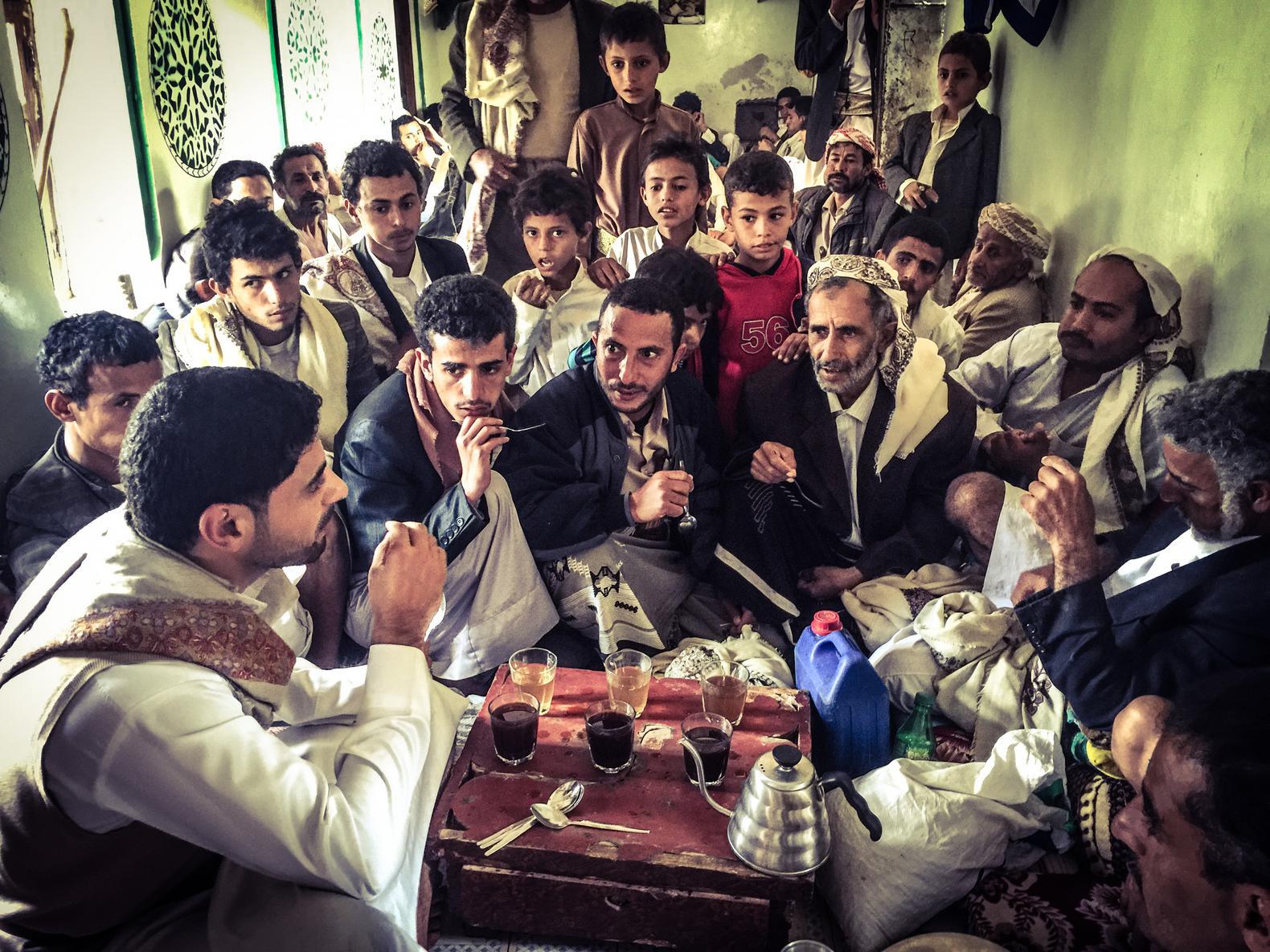
Alkhanshali lets farmers in the Bani Ismail area taste their coffee for the first time.
YOUR COFFEE COSTS 16 DOLLARS A CUP
'Not all my coffee. I also have coffee for $8 or $9 a cup, and the price gets lower the more we can export. You have to remember that it is expensive and complicated to produce coffee in a country in civil war. Besides, our coffee is very good. We received a rating of 97 from Coffee Review (authoritative trade magazine, ed.), the highest rating they gave in their 22 years of existence. Growing coffee in Yemen is difficult, due to the high altitudes and scarcity of water. But a successful harvest can produce a more intense and sweeter-tasting coffee for the same reasons. Because of that score of 97, everyone in the coffee world knew me before Eggers' book was published. It's good coffee, which also happens to have a good story behind it. It is for sale through our website, in coffee shops in the United States, but also in Japan, China, Dubai and France. In the Netherlands, our coffee is sometimes for sale at Boot Koffie in Baarn. Although it is usually sold out everywhere within two months.'
HOW DIFFICULT IS IT TO TRADE WITH A COUNTRY IN CIVIL WAR?
'Very difficult. It was already difficult for me to get out of the country in 2015. So you can imagine that shipping a container of coffee beans to the United States is not very easy. Fortunately, the ports generally remain open. They have to, because Yemen is dependent on imports. But yes, there are air raids, there is always a threat. First of all during the picking, which takes a month and a half, then during the sorting, the drying, the resting. At every step, things can go wrong in Yemen. I always heave a sigh when our container has left the port. But I also know that it is precisely important to keep going. In Rwanda, the coffee trade helped the country get back on its feet after the war.'
HOW DO YOU SEE THE FUTURE OF YEMEN?
'About the political situation I can't say much. There are so many different groups active, each with its own agenda. At the moment the situation in Yemen is extremely worrying. Of the population, 70 percent are food insecure, one million are infected with cholera and two million are on the run. It is the worst humanitarian crisis in the world. I see this book as a bittersweet story of hope, even if it's just a tiny drop in a sea of trouble.'
HOW DID YOU MEET DAVE EGGERS?
'I've known him for about five years. He was working on a script for an HBO series about a Yemeni police officer in San Francisco. I was active in the Yemeni community and was approached as an advisor. I didn't know Dave at all, I didn't know he was a famous writer. He doesn't behave like one, he has a fold-out phone and no wifi in his house. It didn't work out with the TV series, but we became friends. One time I saw his book The Circle at the airport. I took a picture of it and sent it to him: 'Good job!' I had no idea that that book was a huge bestseller. When he proposed to me in 2015 that I do a book about my story, I didn't feel like it at all. I had just left Yemen in that little boat and hadn't yet processed the terrible things I had seen. But the Dutch coffee trader Willem Boot, who also lives in California and with whom I had taken courses, said, 'Dave Eggers? You should do that, because he's a huge author!' Besides, it would be good for my coffee business. In the end, I agreed.'
YOU TALKED TO EACH OTHER FOR 150 HOURS, WENT ON A JOURNEY TOGETHER, TO DJIBOUTI, TO YEMEN, TO ETHIOPIA.
'Yes. In a way, it was all very therapeutic. I had to relive everything: the air raids, the suicide bombing I witnessed, the boat ride. The checkpoints along the way, the masked men with Kalashnikovs of whom you don't know who they are and whether they might kidnap you - or worse. I spent a night in a cell without knowing why. I was constantly in limbo.'
I'm really not much of a hero, I've been afraid of small dogs most of my life
YOU SEEM SO OPTIMISTIC IN THE BOOK, THE COURAGE NEVER SINKS IN, EVEN WHEN YOU GET INTO THE MOST FRIGHTENING SITUATIONS.
'While I'm really not much of a hero, I've been afraid of small dogs most of my life. But in this case, I had a purpose. Besides, I had promised those farmers something. Apparently, something pragmatic came up in me, or I just let it go because I knew I had no influence on the situation anyway. Faith supported me, that was my footing.'
WHY DIDN'T THE AMERICAN GOVERNMENT DO ANYTHING TO EVACUATE AMERICAN CITIZENS, LIKE YOU, FROM YEMEN?
'That's so sad, so shameful. Also because I know that the bombs that Saudi Arabia is dropping on Yemen are not made in Saudi Arabia, they are made in the U.S. China and Russia evacuated their citizens. The U.S. government did not. The reasoning was that there might be terrorists among them. And so it was no big deal if American citizens died in Yemen? I find it incredible. Many people, including me, have risked their lives to get away. And this was under Obama, right? Upon returning home, a press conference had been organized at the airport. During my flight, I had kept in touch with organizations working for safe homecoming for Yemeni Americans. In front of cameras from around the world, I told them what had happened to me. I had bought a jacket at Suitsupply during a stopover at Schiphol Airport, trimmed my beard and shaved off my mustache. I looked like an Amish, like the Yemeni Abe Lincoln. Terrible. These days, I always make sure my hair is right when I have to face media. I learned that from Dave. I learned a lot from Dave.'
WHEN WAS THE LAST TIME YOU WERE IN YEMEN?
'Six months ago, and after this book tour I'm going right back. I try to go three times a year. There's one airport in use, now, where there's a flight from once a week. So traveling has become a little easier. Something, because I still have to change sleeping places often, I travel in an armed convoy. My family belongs to a big tribe, that makes it a little safer. I myself also carry a weapon there, even though I don't like weapons at all. Yemen is the second most armed country per capita after the US, did you know that? The difference is that in Yemen you really need a weapon. Also because I often travel with large sums of cash.'
EVENTUALLY YOU MOVED INTO THE APARTMENT COMPLEX WHERE YOU WERE ONCE A DOORMAN. DO YOU STILL LIVE THERE?
'I lived in that complex for a year, mostly because I wanted to prove to myself that it could be done. It was way over my budget. But I didn't like it. So anonymous. I wasn't happy there. That's where I did experience the best moment of the story: the arrival of my first container of coffee beans. From my balcony I could see the ship perfectly. I would invite my family and all my friends to watch the arrival, I would make snacks, I would put down binoculars. Through an app I could see where the ship was. Suddenly that thing made a jump: the ship came two days earlier, it would be there in an hour. I stood in my underpants and texted everyone I could think of, but everyone was busy. Finally, one person came: Dave. He went on to say, "It's handy to have writers as friends, because they never have anything to do. The two of us watched the ship come in.'



